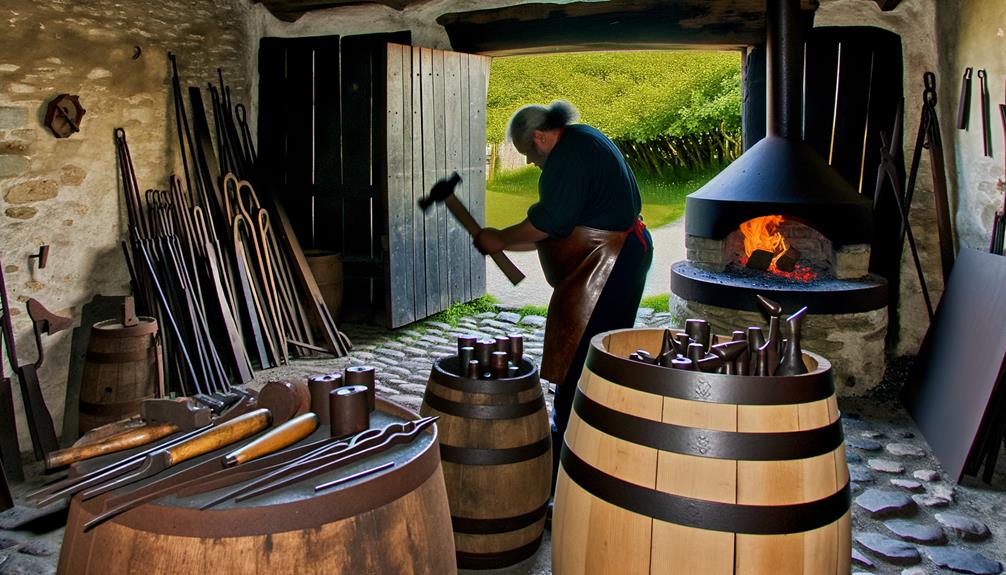Cooper Name Meaning and Origin
The surname Cooper originates from the Middle English term 'couper,' itself derived from the Old English 'cūpe,' which signifies a maker or repairer of wooden vessels. Historically, Coopers were essential artisans responsible for constructing watertight barrels critical for storage and transportation, emerging prominently during the medieval era.
This occupational surname reflects the societal and economic importance of specialized trades in pre-industrial economies. As towns developed, such names helped identify skilled tradespeople, contributing to their social status.
Today, the surname Cooper continues to symbolize industriousness and skill, with notable individuals like Anderson Cooper and Gary Cooper highlighting its lasting legacy across various fields. Discover more about the historical depths and cultural significance of this enduring name.

Key Takeaways
- The surname Cooper originates from the Middle English word 'couper,' meaning a maker or repairer of wooden vessels.
- It derives from the Old English term 'cūpe,' which specifically refers to barrel makers.
- Coopers were essential medieval artisans, producing watertight barrels for storage and transportation of goods.
- The name symbolizes industriousness and specialized craftsmanship in pre-industrial economies.
- Modern bearers like Gary Cooper and Anderson Cooper highlight its widespread cultural relevance and societal impact.
Etymology of Cooper
The surname 'Cooper' originates from the Middle English word 'couper,' derived from the Old English term 'cūpe,' which refers to a maker or repairer of wooden vessels such as barrels, tubs, and casks.
This etymology underscores the occupational roots of the name, linking it to the trade of coopering, an important craft in medieval and early modern societies.
The term 'cūpe' itself is indicative of the specialized skills required to construct and maintain watertight wooden containers, crucial for storage and transportation.
The evolution of the word from Old to Middle English reflects the linguistic shifts occurring during that period, demonstrating how surnames often emerged from professions that were integral to daily life and economic activity.
Historical Background
The surname Cooper traces its origins to the medieval era, where it denoted individuals skilled in the craft of barrel making, a critical trade in a time when wooden containers were essential for storage and transport.
As an occupational surname, Cooper evolved alongside the increasing complexity of medieval economies, reflecting the social and economic importance of specialized trades.
This historical context underscores the integral role that coopers played in supporting burgeoning markets and communities during the Middle Ages.
Medieval Craftsmanship Significance
Throughout the medieval period, craftsmanship held a pivotal role in societal development, with coopers—artisans skilled in barrel making—being essential to various aspects of daily life and commerce. The production of barrels, casks, and other wooden containers by coopers facilitated the storage, aging, and transportation of a myriad of goods, notably wine, ale, and preserved foods.
These containers were indispensable in maintaining the quality and longevity of perishable items, fostering trade both locally and across distant regions. Additionally, the precision and durability of coopered goods underscored the high standards of medieval craftsmanship. By meeting the demands of growing markets, coopers played a significant role in the economic and logistical frameworks that supported medieval communities and their burgeoning trade networks.
Occupational Surname Evolution
As the skill of coopers became central to medieval society, their specialized skills and the economic significance of their trade began to be reflected in the evolution of occupational surnames.
The surname 'Cooper' emerged as a direct reference to individuals engaged in barrel-making, a pivotal trade for storage and transportation of goods.
As records from the 13th and 14th centuries show, occupational surnames were adopted to distinguish tradespeople within growing urban centers. This practice not only facilitated social and economic interactions but also signified a person's trade expertise, contributing to their identity and societal status.
The surname 'Cooper,' therefore, encapsulated the essential role these artisans played, ensuring the preservation and transport of important resources across regions.
The Cooper Profession
Rooted in the craft of barrel making, the cooper profession has a rich history dating back to ancient times, crucial in the storage and transportation of goods. Coopers were indispensable artisans in societies reliant on barrels for the preservation of liquids such as wine, beer, and oil. The craft requires precision and skill, utilizing techniques passed down through generations to guarantee the integrity and durability of wooden containers.
| Era | Key Development |
|---|---|
| Ancient | Invention of wooden barrels |
| Middle Ages | Standardization in wine trade |
| Industrial | Mechanization of cooperage |
The tradition of coopering illustrates the intersection of necessity and craftsmanship, highlighting its essential role in economic and cultural exchanges. This profession not only facilitated trade but also defined the quality standards of stored commodities.
Geographic Distribution
The geographic distribution of the surname Cooper reveals significant regional popularity trends, particularly in English-speaking countries such as the United States, the United Kingdom, and Australia.
Historical records trace its origins to medieval England, where the name proliferated due to the widespread necessity of coopers in society. The surname Cooper itself is derived from the Old English word ‘copere,’ which referred to a maker or repairer of wooden vessels. This profession was highly valued in medieval times, as wooden vessels were essential for transportation, storage, and other aspects of daily life. In a similar vein, the meaning and origin of Derek can be traced back to Old Germanic origins, derived from the name Theodoric, which means “ruler of the people.
Analyzing its global presence, one finds a notable diaspora correlating with patterns of British colonial expansion and migration.
Regional Popularity Trends
Examining the regional popularity trends of the name Cooper reveals a fascinating pattern of geographic distribution, particularly within English-speaking countries. Historically, the name Cooper has its roots in England, where it was derived from the occupational surname for barrel makers.
In modern times, the name has seen significant popularity in the United States and Australia, often ranking highly in baby name charts. This trend can be attributed to cultural influences and the appeal of surnames as given names.
In the UK, Cooper has also maintained a steady presence, reflecting its historical origins. The name's popularity in Canada and New Zealand further underscores its appeal across diverse English-speaking regions, each contributing uniquely to its sustained usage.
Global Presence Analysis
Cooper's global presence is prominently illustrated through its widespread adoption across various continents, reflecting both its historical origins and contemporary appeal.
In the United Kingdom, Cooper remains deeply rooted due to its occupational origins, signifying a lineage of barrel makers.
The name's migration to the United States during colonial times has resulted in a significant concentration there, particularly in states such as New York and California.
In Australia and Canada, the name has also found substantial presence, indicative of British colonial influences.
European countries like Ireland and Germany exhibit notable instances of the surname, though less prevalent.
Modern globalization has further facilitated the dispersion of the name, making it a recognizable surname in diverse regions worldwide.
Early Records
Early records indicate that the surname Cooper can be traced back to medieval England, where it was commonly associated with the craft of barrel-making. The name derives from the Middle English word 'couper' or 'cowper,' rooted in the Old English term 'cuppe,' meaning a container.
Historical documents, such as tax rolls and guild records from the 12th and 13th centuries, often list individuals with the surname Cooper, highlighting their role in the economic and social fabric of the time. The occupational nature of the name underscores the importance of coopering in medieval society, as barrels were essential for storing and transporting goods.
This historical context provides valuable insight into the early prevalence and significance of the Cooper surname.
Cooper Name Variations
The surname Cooper, like many occupational surnames, has undergone numerous variations and adaptations over the centuries, reflecting regional dialects and linguistic shifts. Historically, the name derives from the Middle English word 'couper' or 'cowper,' indicating a maker of barrels or casks. Regional variations include "Couper" in Scotland, while in Germany, the equivalent was "Küfer" or "Kiefer." In Dutch, the name could appear as "Kuiper." These variations often emerged due to phonetic spellings by clerks and scribes unfamiliar with the name's origin.
Additionally, immigration and cultural integration led to further modifications. For instance, "Cooper" might have been anglicized from similar-sounding European surnames, ensuring the name's adaptability and endurance through diverse linguistic landscapes.
Famous People Named Cooper
Throughout history, the surname Cooper has not only demonstrated remarkable linguistic adaptability but has also been borne by numerous notable individuals who have left significant marks in various fields.
In literature, James Fenimore Cooper authored seminal works such as 'The Last of the Mohicans,' influencing American literature profoundly.
The entertainment industry boasts figures like Gary Cooper, an iconic actor of Hollywood's Golden Age whose performances in films like 'High Noon' remain celebrated.
In modern media, Anderson Cooper stands out as a prominent journalist and television personality, known for his incisive reporting on CNN.
These individuals exemplify the diverse contributions of people named Cooper, spanning from artistic endeavors to impactful journalism, each leaving a lasting legacy in their respective domains.
Cultural Significance
Intriguingly, the surname Cooper has woven itself into the cultural fabric of various societies, reflecting a confluence of occupational heritage and evolving social identities. Historically, the name is rooted in the Middle English term 'couper,' denoting a maker of barrels—an essential trade during medieval times. This occupational surname underscores the important role of craftsmen in pre-industrial economies.
As societies modernized, the name Cooper transcended its humble origins, becoming emblematic of industriousness and skill. In literature and media, characters bearing the name Cooper often embody everyman qualities, symbolizing reliability and resilience.
Therefore, the surname encapsulates a rich tapestry of historical significance while continuing to resonate across different cultures and epochs.
Modern Usage
In contemporary times, the surname Cooper has maintained its prominence, often found across diverse professional fields and social strata. Historically rooted in the trade of barrel-making, its modern bearers have branched into myriad sectors including politics, entertainment, and academia.
Notable individuals such as journalist Anderson Cooper and playwright Gary Cooper underscore its widespread adoption beyond its occupational origins. The name's versatility reflects broader societal shifts where surnames, detached from their initial vocational ties, now symbolize a legacy of adaptability and resilience.
This enduring relevance is also evident in its frequent inclusion in popular culture, reinforcing its place in the collective consciousness. Consequently, Cooper remains a tribute to the dynamic evolution of surnames in contemporary society.
Conclusion
The name Cooper, with its profound etymology, illustrious historical background, and association with the indispensable cooper profession, exemplifies a remarkable cultural legacy.
Its extensive geographic distribution and myriad variations highlight its pervasive influence.
The name has been borne by numerous notable individuals, further solidifying its significance.
Understanding the cultural and historical intricacies of the name Cooper reveals an extraordinary narrative that transcends time, offering a window into the rich tapestry of human endeavor and societal development.






